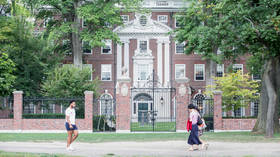Ivy League schools acting like ‘price-fixing cartel,’ lawsuit says

Sixteen top US universities, including a number of prestigious Ivy League schools, have been accused of violating antitrust laws by working together to decide how much financial help should be awarded to prospective students.
The lawsuit, which was filed in Illinois federal court on Sunday, accuses the universities of acting like a “price-fixing cartel” by sharing the methodology they use to determine financial aid packages. Through this, the suit claims the schools “conspired” to limit assistance offers from “supposedly competing” institutions, thereby “artificially [inflating]” the cost of admission for needy students.
Among the institutions named in the suit are Yale, Georgetown, Northwestern, Columbia, Cornell, Duke, Brown, and the Massachusetts Institute of Technology (MIT). The list also includes Chicago, Notre Dame, Pennsylvania, Emory, Rice, and Vanderbilt universities, as well as Dartmouth College and the California Institute of Technology.
Describing the institutions as “gatekeepers to the American Dream,” the five plaintiffs – who were formerly undergrads at some of the accused schools – allege that more than 170,000 students who received financial aid had been overcharged by “at least hundreds of millions of dollars.”
The lawsuit refers to the Improving America’s Schools Act (1994), which allowed 28 universities with a “need-blind” policy – which does not consider applicants’ financial need during the admissions process – to develop a “Consensus Methodology” to determine a student’s ability to pay tuition and other fees.
However, the suit alleges that at least nine universities made admissions after accounting for financial circumstances, violating the ‘need-blind’ rule and favoring wealthy students. The plaintiffs claim this contravenes antitrust exemptions in the 1994 act.
Further, they claim that the other seven institutions “conspired” with these nine universities to reduce financial aid amounts despite allegedly having known that they were not following need-blind policies. The suit seeks unspecified damages and a court injunction banning the “egregious” practice, which they argue places added burden on low- and middle-income families.
While a majority of the accused universities have declined to issue statements, some have claimed that the lawsuit had “no merit.” Spokespersons for Yale and Brown have defended their school’s admissions practices and financial aid policies as being “compliant” with the law. Others said the filing was still being reviewed.












